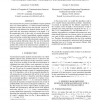Free Online Productivity Tools
i2Speak
i2Symbol
i2OCR
iTex2Img
iWeb2Print
iWeb2Shot
i2Type
iPdf2Split
iPdf2Merge
i2Bopomofo
i2Arabic
i2Style
i2Image
i2PDF
iLatex2Rtf
Sci2ools
127
click to vote
ICASSP
2011
IEEE
2011
IEEE
Rank-deficient quadratic-form maximization over M-phase alphabet: Polynomial-complexity solvability and algorithmic developments
The maximization of a positive (semi)definite complex quadratic form over a finite alphabet is NP-hard and achieved through exhaustive search when the form has full rank. However, if the form is rank-deficient, the optimal solution can be computed with only polynomial complexity in the length N of the maximizing vector. In this work, we consider the general case of a rank-D positive (semi)definite complex quadratic form and develop a method that maximizes the form with respect to a M-phase vector with polynomial complexity. The proposed method efficiently reduces the size of the feasible set from exponential to polynomial. We also develop an algorithm that constructs the polynomial-size candidate set in polynomial time and observe that it is fully parallelizable and rank-scalable.
| Added | 21 Aug 2011 |
| Updated | 21 Aug 2011 |
| Type | Journal |
| Year | 2011 |
| Where | ICASSP |
| Authors | Anastasios T. Kyrillidis, George N. Karystinos |
Comments (0)

